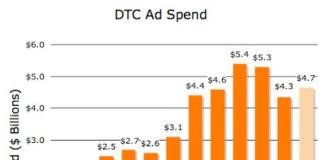 Desperate times call for desperate measures.
Desperate times call for desperate measures.
No, I’m not talking about the “War on Terror.” I am talking about about Takeda’s war to win market share for its beleaguered sleep aid, Rozerem.
Regular readers of this blog know that I have criticized the Rozerem DTC campaign as ineffective and operating in negative ROI (return on investment) mode (see “Rozerem Ad Spending Exceeds Sales!“).
But I am not the only one to see problems with the current Rozerem ad campaign. Recently, I spoke with Lee Weinblatt, Founder and Chief Executive Officer of the PreTesting Company, which tests the effectiveness of DTC and other ads (listen to this Pharma Marketing Talk podcast interview with Lee).
“Talking about dreams means nothing to older people who cannot sleep through the night,” says Weinblatt. “They may keep looking at the beaver, but wondering what Rozerem has to do with dreams.”
Weinblatt concedes that the Rozerem ads enjoy high recall, but he questions if that is enough to sell product.
“Recall by itself means very little to consumers,” says Weinblatt. “They can recall many products, but if you do not make it emotionally important to them—especially when you asking them to call up a doctor, make an appointment, pay a co-pay, and admit to having a problem—you are really going down the wrong path.”
What Rozerem needs is a better DTC campaign that emphasizes the benefits of Rozerem. One such benefit, according to details you can only get by digging deeper on the rozerem.com web site, is that it is non-habit forming.
Only in one Rozerem commercial – “Catch the Bus” – is this advantage espoused by the beaver! But that line goes so fast that if you had taken another bite of snack food you would have missed it!
Cheapskate Sweepstakes!
Maybe that advantage, however, is not enough to emotionally bond with consumers. Takeda needs to find another selling point that it can promote and now has turned to some old-fashioned market research to find the answers.
Hence, the Rozerem Sweepstakes, where you can win “cool prizes” — NO PURCHASE NECESSARY!
But there’s a catch:
“Just tell us a little about yourself and you’ll be entered for a chance to win a Grand Prize or one of 5 second prizes in the Rozerem Sweepstakes!”
The prizes are: Mattress and luxury bedding ensemble — you pick the size — either queen, king, or California king and a 4GB MP3 Player.
An astounding 6 people will win one of these prizes! Total value $4,000 – $5,000, TOPS! This is so cheesy! A company that shamelessly spends about $100 million a year on beaver commercials can only shell out $5,000 in prizes in order to collect vital marketing research data?
The Violation
Well, I couldn’t resist entering the sweepstakes. But, first, I decided to do a little test. The form asked for my date of birth. I entered 02/06/1997, which would make me 10 years old.As expected, the form picked up that I was too young to enter and told me exactly how old I needed to be to enter (see figure below; click to enlarge and read).
As any red-blooded American ten-year old boy who yearned for an iPod would do, I re-entered my date of birth so that the form would accept my data. No problem. It was accepted immediately without question.
This way of handling age entry violates FTC guidelines on collecting personal information from children on the Internet and may be against the law — specifically, the Children’s Online Privacy Protection Act or COPPA. Whoops!
According to the FTC, “For sites that choose to age-screen, age information should be asked in a way that does not invite falsification” and “In addition, we recommend using a temporary or a permanent cookie to prevent children from back-buttoning to enter a different age.” (See COPPA FAQ’s.)
Takeda might face a stiff fine from the FTC if that agency ever caught wind of this. Hmmm… maybe there’s an intern working at the FTC to whom I could complain.
The sweepstakes form goes on to ask the typical kinds of questions:
- When you are having difficulty sleeping (falling asleep), which of the following do you usually do? [FUN ANSWER NOT INCLUDED: Count beavers; wink, wink, nod, nod.]
- How often do you have trouble sleeping?
- What do you think is the cause of your sleep problems? [FUN ANSWER NOT INCLUDED: laying awake wondering what’s with the guy in the space and/or deep-sea diving suit.]
- What interests you about Rozerem? [FUN ANSWER NOT INCLUDED: How it can continue to do so poorly after so much money has been spent promoting it!]
The last question is the money question. Here’s what Takeda wants to know:
- It has shown no potential for abuse or dependence in clinical studies
- It works with my body’s normal sleep-wake cycle
- It won’t make me groggy the next day
- Its side-effects profile
- I can take it when I need it and stop when I don’t
Now how would consumers know these things? Certainly, they are not highlighted in the ads. I guess this is less about actual research and more about planting benefit statements in the minds of respondents.
P.S. Good luck with that!









![6 Digital Tools at the Center of Healthcare Digitalization [INFOGRAPHIC]](http://ec2-54-175-84-28.compute-1.amazonaws.com/pharma-mkting.com/wp-content/uploads/2021/04/6DigitalTools_600px-100x70.jpg)




